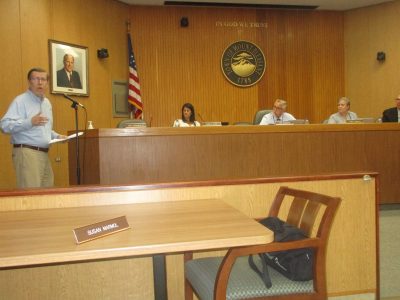Mt. Pleasant Sued After Refusing to Furnish Town E-mail List
News Based on facts, either observed and verified directly by the reporter, or reported and verified from knowledgeable sources.

A fierce opponent of Mount Pleasant’s proposed Comprehensive Plan update has filed an Article 78 to gain access to the town’s list of residents’ e-mail addresses to share information with the public about town events and issues.
Hawthorne resident James Russell submitted the litigation on May 3 to the state Supreme Court in White Plains after his Freedom of Information Law (FOIL) request was denied by the town and a subsequent appeal was rejected by Supervisor Carl Fulgenzi last December.
Russell said he would like to communicate with the roughly 2,000 residents who are signed up for and receive the town’s e-mail notifications of news and events to provide them with a different perspective of the impact the updated plan and zoning code could have on the town. Furthermore, he said many residents are unfamiliar with or unaware of the proposed changes.
“They’re just talking about a corridor that is one-and-a-half miles long and if that is turned into even three-story apartments, if you have a large builder like Toll Brothers come in there and start building, that could have a major impact, perhaps several properties at a time,” Russell said.
He has repeatedly criticized a key provision of the Comprehensive Plan’s update at public hearings and meetings that would allow for a second and third floor of apartments above ground-floor commercial, arguing that it would change the character of the town.
Officials are eyeing the stretch of Route 141 from near the Hawthorne train station to Thornwood and about a dozen properties on Broadway behind the train station to provide owners a financial incentive to make aesthetic improvements to their structures by allowing them to add second- and third-floor apartments. It would also help diversify housing stock in the town, officials have argued.
In his filing with the court, Russell cited a 2016 Appellate Division ruling against the Town of Greenburgh, which was forced to provide a member of the public with its list of e-mail addresses of residents who had signed up for the town’s alerts.
“It’s totally allowed and that’s why I want to provide some information,” Russell said.
However, Fulgenzi said last week that the town has denied Russell’s request because he believes furnishing the list to anyone outside of the town’s operations would invade people’s privacy.
“I felt that it is a privacy issue because (when) people sign up for e-mail alerts they sign up for town information, they don’t sign up to give their personal e-mail outside of what we’re sending them,” Fulgenzi said.
He also disputed Russell’s characterization that many residents are unfamiliar with the Comprehensive Plan. The town has held at least six months of hearings, held public engagement sessions in the spring and summer of 2018 to build the proposal that reflected those sentiments, Fulgenzi said.
In his Article 78, Russell argued that the town promises to post agendas on its website for its Tuesday evening Town Board meetings at least 72 hours in advance. However, that schedule is sometimes not kept, he contended.
He provided a screenshot of the website from Monday, Apr. 25 at 9:24 a.m., which failed to show a posted agenda yet for the following evening’s meeting, one example of “depriving Town residents of the timely knowledge of the Town business that is to be discussed, regarding which some may wish to attend and offer their opinions.”
A statement to The Examiner from the Committee on Open Government in Albany, a state office that provides legal opinions regarding New York’s Open Meetings laws and public documents, mentioned that the burden is on the municipality to prove that privacy is being violated, a standard not met by Greenburgh.
“It sort of left open a little bit of wiggle room for other municipalities that might do a better job at justifying non-disclosure,” according to the statement.
Fulgenzi said the litigation has been discussed with the town’s counsel, and even though the Town of Greenburgh lost in what appears to be a similar case, the town will not budge.
“I disagree with it in this particular case because I know exactly what he’s trying to do,” Fulgenzi said of Russell. “What resident wants to hear from a disgruntled resident, saying that what you hear from the town is BS? Everyone’s entitled to come to a meeting and voice their opinion and ask questions or come into my office at any time.”
Fulgenzi then said that Russell’s intent is likely to keep the town from having too much diversity. He referred to an old essay Russell had written that was uncovered during his 2010 congressional run against Nita Lowey where he opposed integration and immigration.
“It’s just not right,” Fulgenzi said. “His thinking is not clear to the general public. We want people of all nationalities in our town, all religions, and to say others should not be allowed to be in our town, that’s wrong.”

Martin has more than 30 years experience covering local news in Westchester and Putnam counties, including a frequent focus on zoning and planning issues. He has been editor-in-chief of The Examiner since its inception in 2007. Read more from Martin’s editor-author bio here. Read Martin’s archived work here: https://www.theexaminernews.com/author/martin-wilbur2007/
